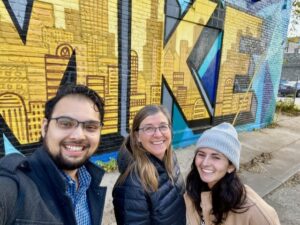Environmental justice has been a topic of rising prominence in recent years. Through a partnership between Wisconsin Sea Grant and the Center for Water Policy in the School of Freshwater Sciences at the University of Wisconsin-Milwaukee (UWM), two fellows were hired over the 2021-22 year to conduct special projects in this area through a legal lens.

Fellows Misbah Husain (left) and Sarah Martinez (right) pose by a colorful, Milwaukee-themed mural with Center for Water Policy Director Melissa Scanlan (center).
The two Sea Grant UW Water Science-Policy Fellows were Misbah Husain and Sarah Martinez. (Learn more about them in this UWM story from last September.) As their fellowships wound down, the two gave an engaging webinar last month to summarize their work.
The webinar was hosted by the National Sea Grant Law Center and a recording is available here.
During the webinar, Melissa Scanlan, director of the Center for Water Policy, commented that it was “such a pleasure to be able to work with them” over the past year because both Husain and Martinez are “creative thinkers” when it comes to exploring intersections between water policy and environmental justice.
While watching the full session recording is well worth your time, here’s a brief snippet of what each fellow spoke about.
Martinez, a graduate of the University of Utah’s S.J. Quinney College of Law, investigated barriers to what she termed “blue space access”—meaning lakes, rivers and other aquatic spaces. Systemic racism and economic inequality have formed major hurdles in using these blue spaces.
Martinez also talked about hosting a conversation earlier this year about public rights and Milwaukee’s “Fresh Coast future.” (Here’s public radio coverage of that from WUWM.) The public’s right to access our waters is written into the state’s constitution in the form of the Public Trust Doctrine, which asserts Wisconsinites’ right to navigation, recreation, water quality and the enjoyment of scenic beauty.
Martinez is working on a policy brief on related to Milwaukee’s Fresh Coast future with the Center for Water Policy, as well as two forthcoming law review articles.
Husain, a Boston College Law School graduate who also holds a master’s in social work, spent his fellowship year focusing on links among climate change, disadvantaged communities and flooding. In this context, “disadvantaged communities” can refer to their proximity to pollution, language barriers and other factors.
One of the most enjoyable aspects of his fellowship, said Husain, was working with a wide range of people, from those in academia to government, non-governmental organizations and other entities. He’s currently preparing a law review article with Scanlan. (Update: that article is now available, and you can find it here.)
After the webinar, I checked in with Sea Grant Associate Director Jen Hauxwell, who explained how this partnership between Sea Grant and UWM came about.
“For several years, Sea Grant has been interested in supporting law fellows, but we lacked the legal expertise to provide quality mentorship,” recounted Hauxwell. “Partnering with Melissa Scanlan, a leading legal scholar in water policy, helped us turn our interest into a real possibility.”
Support from Wisconsin Sea Grant and the UW Water Resources Institute also helped bring this idea to life.
“I’m so pleased that we have been able to recruit outstanding new lawyers like Misbah and Sarah to tackle a variety of Wisconsin water challenges, including water justice issues,” said Hauxwell.
The fellowship program will continue in 2022-23. Fellows arriving this fall will be Anya Janssen (JD/MA, University of San Diego) and Andrian Lee (JD, Boston College Law School), both 2022 graduates.


